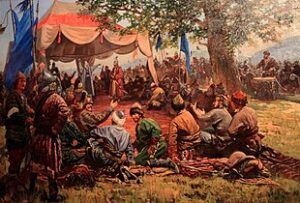In the year 1188, Ertuğrul Gazi was born. Gundüzalp is his father, and Hayme Hatun is his mother. He lives in Turkey. His siblings were named Sungur Tekin, Gündoğdu, and Dündar all of them were his siblings. Ertuğrul Gazi, a member of the Kayı clan of the Bozok branch of the Oghuzs, is the father of Osman Bey, the founder of the Ottoman Empire. When the Mongols invaded the region in the 9th century, Ertuğrul Gazi’s forefathers made their way to the Horosan region by way of Bukhara and Samarkand. Together with the Seljuks, they traveled via Azerbaijan to arrive in Eastern Anatolia and eventually arrived in Ahlat, which is situated to the west of Lake Van. This occurred in the second part of the 11th century. After some time, they arrived in Anatolia from this location.
After the passing of their father, Ertuğrul Gazi and his brothers found themselves in a state of turmoil.  Ertuğrul Gazi, accompanied by his mother Hayma Ana and his younger brother Dundar Bey, embarked on a journey to the Sürmeliçukur area, bringing with him a group of 444 tents. After that, he finally arrived in Ankara and made his home in Karacadağ. The brothers Sungur Tekin and Gündoğdu made their way back to their former homeland, which was located in Horasan. In the fight between the Seljuks and the Khwarezmshahs in Yassi Çimen, located between Erzurum and Sivas, the Kayılar, under the direction of Ertuğrul Gazi, allied with the Seljuks and insured the defeat of the Khwarezmshahs.
Ertuğrul Gazi, accompanied by his mother Hayma Ana and his younger brother Dundar Bey, embarked on a journey to the Sürmeliçukur area, bringing with him a group of 444 tents. After that, he finally arrived in Ankara and made his home in Karacadağ. The brothers Sungur Tekin and Gündoğdu made their way back to their former homeland, which was located in Horasan. In the fight between the Seljuks and the Khwarezmshahs in Yassi Çimen, located between Erzurum and Sivas, the Kayılar, under the direction of Ertuğrul Gazi, allied with the Seljuks and insured the defeat of the Khwarezmshahs.
Seljuk Sultan Alaaddin Keykubad I thanked the Kayı people under the leadership of Ertuğrul Gazi for their contributions in this fight and donated Karacadağ to the west of Ankara as a winter pasture.
When Ertuğrul Gazi settled in Karacadağ, he battled against the Byzantines in the territory between Ankara and Eskişehir. He conducted raids on İnegöl and Yenişehir. Ertuğrul Gazi was in the service of the Seljuks as the leader of the foremost forces in this attack. The Byzantine army was heavily beaten in the Armenian derby. After this conquest, the Sultan awarded Ertuğrul Gazi and granted Eskişehir (Sultanönü) and its surrounds a place of affluence.
Later, Karacahisar and Söğüt were seized. Seljuk Sultan Alaaddin Keykubad I bestowed Domaniç, Söğüt and their surrounds as a homestead to Ertuğrul Gazi. Ertuğrul Gazi, who spent the summers on the Domaniç plateaus and the winters in Söğüt, maintained the north-western borders of the Seljuk State in the best possible way and secured security. Ertuğrul Gazi gained the title of “Gazi” after his triumphs over the Byzantine tekfurs.
 At a period when the Seljuk State was under the dominion of the Mongols, and the Turkish Principalities in Anatolia were breaking from the Seljuks, Ertuğrul Gazi demonstrated allegiance and maintained his actions as a margrave loyal to the Seljuks. As a consequence of this allegiance of Ertuğrul Gazi, warriors, dervishes, academics from all across Anatolia, and Turkmens from distant areas united under his banner.
At a period when the Seljuk State was under the dominion of the Mongols, and the Turkish Principalities in Anatolia were breaking from the Seljuks, Ertuğrul Gazi demonstrated allegiance and maintained his actions as a margrave loyal to the Seljuks. As a consequence of this allegiance of Ertuğrul Gazi, warriors, dervishes, academics from all across Anatolia, and Turkmens from distant areas united under his banner.
Ertuğrul Gazi maintained a peace-centered, cautious and careful approach due to the low population of his tribe during his period. He got along well with the Turkmen princes and Byzantine rulers around him and maintained his tribe and the subjects under his control living in peace.
Ertuğrul Gazi bequeathed his son Osman Bey a modest principality, skilled commanders, a solid reputation and a perfect platform for conquest.
CHILDREN
 Ertuğrul Gazi married Halime Hatun. He had three sons called Gazi Sarı-Batı Savcı Bey (death: 1288), Gündüz Alp (death: 1306), and Osman Bey (1258-1326).
Ertuğrul Gazi married Halime Hatun. He had three sons called Gazi Sarı-Batı Savcı Bey (death: 1288), Gündüz Alp (death: 1306), and Osman Bey (1258-1326).
WHO ARE ERTUĞRUL GAZİ’S WIVES?
Ertuğrul Bey, who lived for 93 years, was married once in history. He married Halime Hatun, his only marriage. With the death of Halime Hatun in 1281, Ertuğrul Gazi also gained God in the same year.